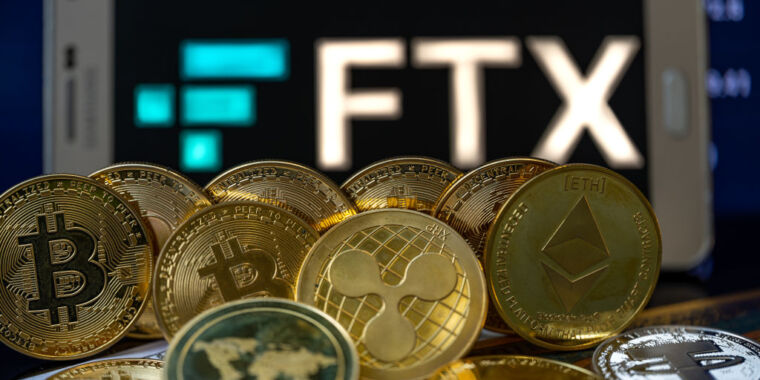FTX to pay $12.7B to victims of Sam Bankman-Fried’s massive scheme

FTX, the bankrupt cryptocurrency exchange formerly helmed by fraudster Sam Bankman-Fried, has agreed to pay $12.7 billion to customers blindsided by Bankman-Fried’s deceptions covering up FTX’s flagrant misuse of customer funds.
In an order yesterday, US District Judge P. Kevin Castel said that FTX must pay $8.7 billion in restitution to victims of Bankman-Fried’s fraudulent scheme, as well as disgorge another $4 billion in “gains received in connection with the violations” to further compensate customers who suffered significant losses.
According to Ian McGinley, the division of enforcement director for the Commodity Futures Trading Commission (CFTC), “this multi-billion-dollar recovery for victims” is “the largest such recovery in CFTC history.” And the CFTC “achieved it with remarkable speed,” McGinley boasted.
“FTX’s massive fraud collapsed 21 months ago, and in that time, the CFTC investigated, filed a complaint, and achieved what many thought was impossible at the time of the collapse—a resolution to compensate victims for the losses they suffered,” McGinley said.
FTX could have owed more, but because the CFTC prioritized the speedy repayment of victims, the CTFC “agreed not to seek a civil monetary penalty against FTX” in a related settlement agreement approved by the Bankruptcy Court for the District of Delaware, the CFTC said in a press release celebrating the order.
Restitution comes after Castel found that FTX had violated the Commodity Exchange Act (CEA) and CFTC regulations. His order “imposes injunctions against further violations of the CEA and CFTC regulations, as well as trading and registration prohibitions, and requires FTX and Alameda to cooperate with the CFTC in its ongoing litigation,” the CFTC said.
Customers will be eligible for disgorgement through a supplemental remission fund if FTX’s plan is approved in ongoing bankruptcy proceedings, the CFTC said.
In his order, Castel noted that FTX had been touted as “the safest and easiest way to buy and sell crypto,” while FTX “commingled assets and freely used assets deposited by FTX customers as if they were Alameda’s assets”—which included using their assets to fund their promotions deceiving customers. Customer funds were also misappropriated to bail out “several digital asset companies with loans or acquisitions” and pay off FTX’s debts.
CFTC chairman Rostin Behnam chastised FTX for using “age-old tactics to create an illusion that it was a safe and secure place to access crypto markets,” while taking advantage of the fact that “the basic regulatory tools, like governance, customer protections, and surveillance that exist to identify misconduct and ultimately prevent collapse, were simply not there.”
FTX fraudsters banned from trading crypto
The fraud didn’t come to light until the crypto market crash of May 2022, when “many FTX customers began requesting to withdraw assets from the exchange,” Castel wrote, and quickly found out their assets weren’t readily available.
Instead of being honest with customers, Bankman-Fried and others at FTX publicly pretended there was a liquidity problem while internally acknowledging that the real problem was misappropriating customer funds. Even once it became obvious that FTX did not have enough funds to cover withdrawals, the exchange falsely reassured customers that all “deposits were safe,” Castel said.
Because of these misleading statements and many others, Castel ordered a permanent injunction that seemingly applies to anyone involved with FTX’s fraud—including FTX, Alameda Research, Sam Bankman-Fried, Caroline Ellison, Gary Wang, and “any of their affiliates, agents, servants, employees, successors, assigns, attorneys, and persons in active concert or participation with them.”
The injunction blocks them from trading on any registered entity and from holding or entering into any transactions involving commodity interests or digital commodities, including bitcoin (BTC), ether (ETH), or tether (USDT). They also cannot control or direct trading of these commodities, among other restrictions on trading and registration.
Disbursement of restitution and disgorgements will be managed either by an administrator approved by the bankruptcy court or by FTX’s CEO, John J. Ray III, who condemned the FTX scheme as “a complete failure of corporate controls” thriving off “a complete absence of trustworthy financial information,” Castel’s order noted.
While the CFTC celebrated the speed of winning these repayments to FTX customers, it does not seem that disbursement will be immediate. In his order, Castel wrote that Ray would be responsible for sending annual progress reports “detailing the disbursement of funds or assets,” suggesting repayment may stretch on for years.
If FTX unduly delays payments once a plan is established, it may be required to repay whatever is owed at that time to customers to the CFTC immediately, the order said.
For victims wondering where to turn next to continue trading digital assets, more regulations might come as a comfort. But the cryptocurrency industry continues to lobby to evade regulations, OpenSecrets reported in May.
Until there’s more regulatory clarity, Behnam, the CFTC chairman, vowed to continue working to uncover schemes to stop the next FTX.
“This is just the tip of the iceberg,” Behnam said. “In the absence of digital asset legislation to fill regulatory gaps, entities will continue to operate in the shadows without these basic tools of sound regulation, sharpening their deceptive practices and continuing to dupe customers.”
Source link





